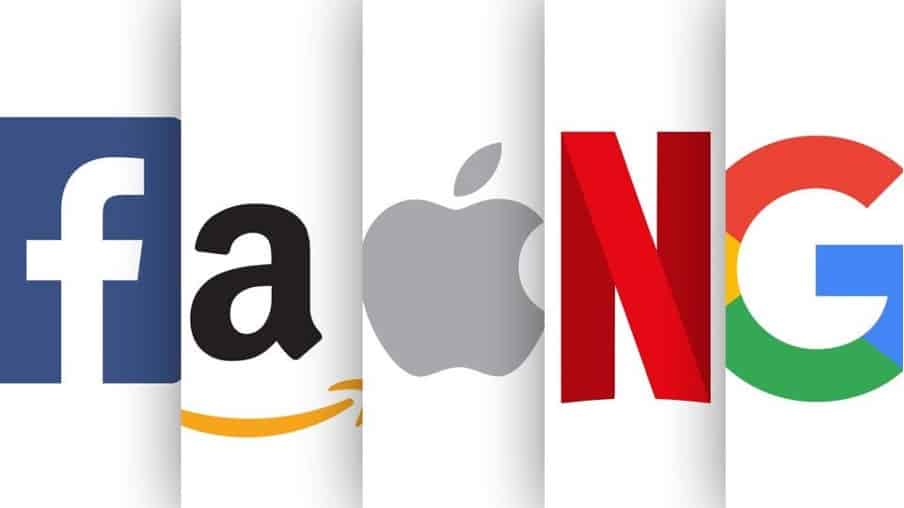Facebook, Amazon, Alphabet, Netflix, and Google could all now be buying opportunities as the US earnings season begins amid investor flight to safety.
First coined by ‘Mad Money’ host Jim Cramer back in 2013, the 5 ‘FAANG’ companies are US tech stocks that are ‘totally dominant in their markets.’
And you don’t need to be an investor to know their names — Facebook (now Meta), Amazon, Netflix, Google (now Alphabet), and late arrival Apple, which was added to the acronym in 2017.

While these NASDAQ-listed stocks have taken a hammering in 2022 as a result of tightening monetary policy and rising inflation, the five constitute some of the most valuable companies in the world. Market titan Apple’s $2.5 trillion market cap makes it more valuable than the entirety of the UK’s FTSE 100 alone.
Of course, as the market peaked in November last year, investor fears of a bursting FAANG bubble were confirmed. The NASDAQ Composite has now fallen 25% year-to-date to 11,898 points, hit by supply chain issues, an upcoming recession, and rising inflation and interest rates.
However, FAANG stocks have overwhelming market dominance in their respective spaces. They’re not going anywhere anytime soon, and this makes the current dip in all five an excellent time to consider a long-term investment.
However, it’s worth noting that with the recent market volatility, investors disagree on their near-term trajectory. But with earnings season upon us, now may be an excellent time to start.
FAANG stocks: time to recover?
Facebook, now Meta Platforms, is down 46% year-to-date after losing daily active users for the first time earlier this year. Under the direction of CEO and founder Mark Zuckerberg, the company is investing $1 billion a month into its Reality Labs division, hoping to tap into its first mover advantage for the metaverse, which McKinsey estimates will be worth $5 trillion by 2030.
The social media company has 2.936 billion users on its Facebook platform, and also owns market-domineering WhatsApp and Instagram. While competition from ByteDance-owned TikTok and antitrust problems remain major threats, it is the undisputed king of social media.
Amazon shares are down 28% year-to-date as the twin threats of recession and rising interest rates have put the brakes on its previously exceptional growth.
New CEO Andy Jassy is taking the world’s largest e-commerce retailer into a new phase of development, having announced plans for a stock split and $10 billion share buyback. Seeing full-year sales rise 22% in 2021 to $469.8 billion, the company would have to increase sales by over $100 billion in full-year 2022 to maintain the same pace of growth.
Of course, with its 33% market share, Amazon’s cloud division AWS is the market leader in cloud computing.
But most agree the same previously stratospheric rate of growth for the wider business is simply not possible in the current economic environment.
Apple is the most valuable company in the world, renowned for its iPhone and MacBook computer systems. Nevertheless, it is not immune to the current downturn, with its share price down 16% year-to-date amid a hiring slowdown.
However, Q2 revenue increased by 9% year-over-year to a record $97.3 billion. In the words of CEO Tim Cook, the quarter’s ‘record results are a testament to Apple’s relentless focus on innovation and our ability to create the best products and services in the world.’
Apple’s core strength is its horde of loyal customers as well as its overwhelming dominance in the premium computing segment. Encouragingly, its continued share price fall combined with record earnings could represent a mismatch between sentiment and reality.
Netflix is the poster child for the streaming age, but down 64%, has suffered a terrible 2022. The streamer has started losing lockdown subscribers both to the cost-of-living crisis, as well as titanic competitors such as Disney+, Amazon, and Apple.
However, it only lost 1 million subscribers in Q1, half the number it had previously feared, and its share price has begun to recover in recent days.
Moreover, it generated $8 billion in Q1 revenue, and plans to introduce advertising and sharing subscription plans to ‘accelerate our revenue and membership growth by continuing to improve our product, content and marketing as we’ve done for the last 25 years, and to better monetize our big audience.’
Insider Intelligence analyst Ross Bene warns that ‘unless it finds more franchises that resonate widely, it will eventually struggle to stay ahead of competitors.’ Worryingly, it’s also laying off staff.
But with over 220 million subscribers, and a catalogue of unmissable original content, many argue the tech stock remains significantly oversold.
Google, now a division of Alphabet, rounds off the FAANG stock list. Down 22% year-to-date, the lion’s share of the NASDAQ company’s revenue comes from its near-monopolistic search and advertising division.
After its recent stock split, the company is pausing hiring for two weeks, a bearish sign for upcoming Q2 results. But for the bulls, it made $75.3 billion in Q1 revenue, up 32.6% year-over-year.
Further, the longer-term growth story for Alphabet is undeniable. Its shares rocketed 70% in 2021 due to rapid growth in e-commerce custom, video platform YouTube users, and increased sales at Google Cloud, which saw revenue increase 44% year-over-year to $5.8 billion in Q1.
Of course, the first thing to be cut in recessions is marketing. But Alphabet shares are surrounded by a protective moat; it is essentially impossible to undercut its search business.
And with the upcoming recession baked in, positive earnings for the FAANG stocks could spark a strong recovery.

Leave a comment